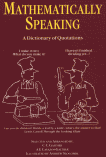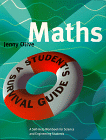Book reviews
Mathematically Speaking - A dictionary of quotations

Every so often, it's nice to have a quotation - whether it's to impress someone with your erudition (look it up) and wide literary knowledge, to head a chapter in a textbook someone's asked you to write, or simply to stick on your office/bedroom door to explain your attitude to life/amuse people/tell them you're not at home. You can get through life without quotations, but it's often more fun to use them.
The use of apt quotations can also be a way of establishing a coterie (the dictionary's on the third shelf - right hand end) of like-minded people. For example, devotees of the Hitchhiker's Guide to the Galaxy will use the terms "Forty-two", "out to lunch" and "Life? - don't talk to me about life!" with confidence and a slight smile, knowing that a fair proportion of the audience will enjoy it and understand what they mean. Actually, I'm not sure I've punctuated that last one correctly - I'll have to look it up.
Quotations can also frustrate. You've heard it. You like it - but where did it come from? Mathematically Speaking is a dictionary of quotations about mathematics, ably selected and arranged by C.C.Gaither and A.E. Cavazos-Gaither. As a bonus, it's got some nice cartoons in it as well.
The chapters are arranged in alphabetical order by topic; for example, Discovery is followed by Divergence,Division, then "e". You can use it to look up a quotation on a particular subject, or you can browse and enjoy.
It's even fun for non-mathematicians. I know, because I showed it to my wife - a proud non-mathematician - and she laughed out loud several times, then turned to the index and was pleased to find that Tom Lehrer had three entries, Lewis Carroll fourteen entries and Douglas Adams two. And she liked the one about the polar bear on page 353.
- Book details:
- Mathematically Speaking
- C.G. Gaither, A.E. Cavazos-Gaither
- Paperback - 495 pages (April 1998)
- The Institute of Physics; ISBN: 0750305037
Maths: A student's survival guide

This book describes itself as a "friendly and gentle self-help workbook" and says that it's aimed at first year undergraduate scientists and engineers. It is in fact a useful, if rather boring, revision text - but I would take issue with it being the right level for first year undergraduates. It strikes me as rather more suitable as a top-up A Level revision text, especially for A Level physicists and chemists who don't have the joy of doing mathematics at the same time. Beneficially, it provides lots and lots of examples to work through, in a way that went out of fashion in the late sixties but is nevertheless essential for gaining a real facility with the subject.
Unfortunately for the engineers, there's no mechanics, and neither is there any statistics or probability - so no joy for biologists either (though to be fair the book was not intended for them). So - it's a useful text for A-level revision, if the style suits you. It'll give you another way of looking at topics. It'll give you examples to try. But don't buy it if you're a first year undergraduate who's done A Level maths recently.
One real use I can imagine for this book would be for people coming back to mathematics after years away from the subject. For this group it could be invaluable, as it assumes very little knowledge, and all the answers are nicely explained at the back of the book. But for those for whom it was intended - it's pitched rather lower than it should be. It's a crammer. Use it to pass exams, rather than to explore mathematics. It's by Jenny Olive, and is published by CUP.
- Book details:
- Maths: A Student's Survival Guide
- Jenny Olive
- Further details on-line
- Paperback - 575 pages (6 June, 1998)
- Cambridge University Press; ISBN: 0521575869
My Brain is Open - The mathematical journeys of Paul Erdös

The English are meant to be the most prolific producers of eccentrics in the world - and also the most tolerant of them, having a quiet pride in any of our countrymen (or women) who are able to be "different" without worrying about what the neighbours say. This book is about a man who was certainly eccentric, but also a mathematical genius, with a seriously unusual lifestyle.
Paul Erdös was Hungarian, a mathematical prodigy, who from the early 1940s until the end of his long life in 1996 never had a regular job. He travelled the world, staying with other mathematicians and working with them. He was the most prolific mathematician that has ever lived. Mathematicians today quote their "Erdös number" - which states how far you are from publishing a paper in collaboration with Erdös. Most have an Erdös number not exceeding three (where "1" is actually publishing a paper with Erdös, "2" is publishing with someone who published a paper with Erdös, etc...)
Because of his peripatetic lifestyle, never holding down a job and travelling constantly, Erdös never had much money. When he did come into money he tended to give most of it away - usually to mathematics students who could not afford the next stage in their studies. But although his life revolved around mathematics, with no home, family or job to distract him, he was also well read in history and politics, and spoke many languages.
Bruce Schechter's book is an affectionate and well-written tribute to a remarkable man. We're taken through Paul Erdös' life, and through just a little of his mathematics with wit and enthusiasm - a fascinating read!
- Book details:
- My Brain Is Open
- Bruce Schechter
- Hardcover - 224 pages (1 October, 1998)
- Oxford University Press; ISBN: 0198504713